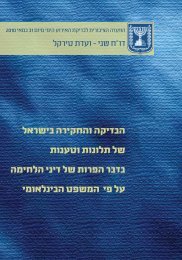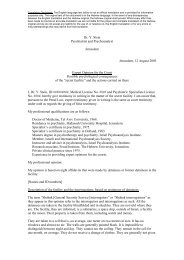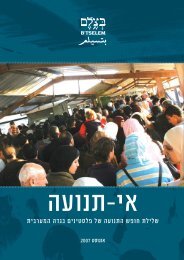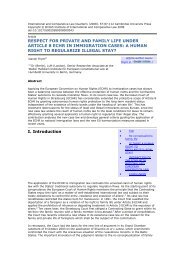HCJ 10650/03 Abu Gwella et. al v
HCJ 10650/03 Abu Gwella et. al v
HCJ 10650/03 Abu Gwella et. al v
Create successful ePaper yourself
Turn your PDF publications into a flip-book with our unique Google optimized e-Paper software.
Examples of the correspondence on the subject b<strong>et</strong>ween P<strong>et</strong>itioner 6 and Respondent 3<br />
and the Leg<strong>al</strong> Department of the Respondents are attached as Appendix P/20, above.<br />
65. However, <strong>al</strong>though the wording of the government’s decision does not mention that it<br />
applies to residents’ minor children, the Respondents did not inform the public of their<br />
decision. The Respondents operate a Website that is supposed to publish the<br />
procedures instituted pursuant to their powers and functions. The Website, too,<br />
contained no information on how to arrange the status of children in the situation of<br />
the children who are the subject of this p<strong>et</strong>ition, or about the government’s decision on<br />
this subject.<br />
The Respondents’ policy in 20<strong>03</strong><br />
66. As in other years, this year, too, changes in the Respondents’ policy on arranging the<br />
status of children were d<strong>et</strong>ected.<br />
67. The most significant change, about which we sh<strong>al</strong>l expand below, is the adoption into<br />
law of the government’s decision <strong>al</strong>so as regards arranging the status of residents’<br />
children.<br />
An exception that did not appear in the government’s decision was added to the<br />
statute, whereby the minister or the region<strong>al</strong> commander may grant a permit to reside<br />
in Israel to prevent the separation of a child under age 12 from his resident parent.<br />
The statute’s language is clear: a child over age 12 is not entitled, by law, to have<br />
discr<strong>et</strong>ion exercised on wh<strong>et</strong>her to grant him a status in Israel, the country in which he<br />
lives tog<strong>et</strong>her with his parent, a permanent resident of the state.<br />
68. As regards children under 12 who were born outside of Israel, who may be granted a<br />
status pursuant to the statute, it appears that the Respondents changed the procedures<br />
for considering the request. They decided to institute a graduated test period of 5 /4<br />
years that commences upon initi<strong>al</strong> approv<strong>al</strong> of the request. The arrangement is<br />
prolonged, expensive, and exhausting, and has been used only for requests for<br />
residency status on beh<strong>al</strong>f of the spouse, which has <strong>al</strong>ways been referred to as a<br />
“request for family unification,” to distinguish them from a “request for child<br />
registration.” Furthermore, it is clear that the Respondents will not grant permanentresident<br />
status to children over 12 years old; thus, at best, only children up to age six<br />
can benefit from the arrangement.<br />
The Respondents’ new policy was never published, and no public announcement was<br />
made. P<strong>et</strong>itioner 6 learned of it in the course of its handling of the p<strong>et</strong>ition currently<br />
21









